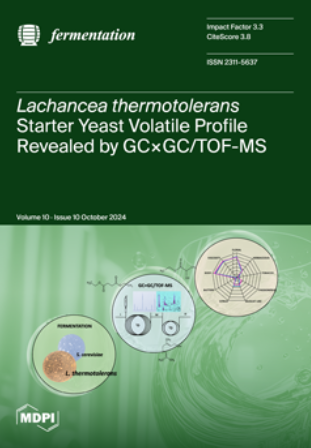Exploring the Potential of Non-Conventional Yeasts in Wine Fermentation with a Focus on Saccharomycopsis fermentans
IF 3.3
3区 农林科学
Q2 BIOTECHNOLOGY & APPLIED MICROBIOLOGY
引用次数: 0
Abstract
Despite the increasing number of publications on non-conventional yeasts (NCYs), many areas in this field remain poorly understood, making the examination of these strains important for determining their potential in wine fermentations. The amino acid metabolic pathways involved, particularly the catabolic Ehrlich pathway but also anabolic pathways such as the leucine biosynthesis pathway, are crucial for producing high-value aroma compounds that contribute to the final flavour of wine. We examined the potential use of Saccharomycopsis fermentans in wine fermentations. We selected mutant strains resistant to the toxic compound trifluoro-leucine (TFL), verified mutations in the SfLEU4 gene, and characterized the ability of the resulting strains to contribute to fermentation bouquets. Resistance to TFL relieves feedback inhibition in the leucine biosynthesis pathway and resulted in increased leucine biosynthesis. Concomitantly, the S. fermentans TFL-resistant mutants generated increased amounts of isoamyl alcohol and isovalerate during wine fermentation. Selection of TFL-resistant strains thus provides a generally applicable strategy for the improvement in NCYs and their utilization in co-fermentation processes for different grape must varieties.探索非传统酵母在葡萄酒发酵中的潜力——以发酵酵母菌为重点
尽管关于非传统酵母(NCY)的出版物越来越多,但该领域的许多领域仍知之甚少,这使得对这些菌株的检测对于确定其在葡萄酒发酵中的潜力非常重要。所涉及的氨基酸代谢途径,特别是分解代谢的埃利希途径,以及合成代谢途径,如亮氨酸生物合成途径,对于产生有助于葡萄酒最终风味的高价值芳香化合物至关重要。我们研究了酿酒酵母在葡萄酒发酵中的潜在用途。我们选择了对有毒化合物三氟亮氨酸(TFL)具有抗性的突变菌株,验证了SfLEU4基因的突变,并表征了所得菌株对发酵花束的贡献能力。对TFL的抗性缓解了亮氨酸生物合成途径中的反馈抑制,并导致亮氨酸生物合成增加。同时,发酵链球菌TFL抗性突变体在葡萄酒发酵过程中产生了增加量的异戊醇和异戊酸酯。因此,选择耐TFL菌株为改善NCY及其在不同葡萄品种的共同发酵过程中的利用提供了一种普遍适用的策略。
本文章由计算机程序翻译,如有差异,请以英文原文为准。
求助全文
约1分钟内获得全文
求助全文
来源期刊

Fermentation-Basel
BIOTECHNOLOGY & APPLIED MICROBIOLOGY-
CiteScore
3.80
自引率
18.90%
发文量
594
审稿时长
7 weeks
期刊介绍:
Fermentation-Basel is an international open access journal published by MDPI, focusing on fermentation-related research, including new and emerging products, processes and technologies, such as biopharmaceuticals and biotech drugs. The journal enjoys a good reputation in the academic community and provides a high-impact forum for researchers in the field of bioengineering and applied microbiology.
 求助内容:
求助内容: 应助结果提醒方式:
应助结果提醒方式:


